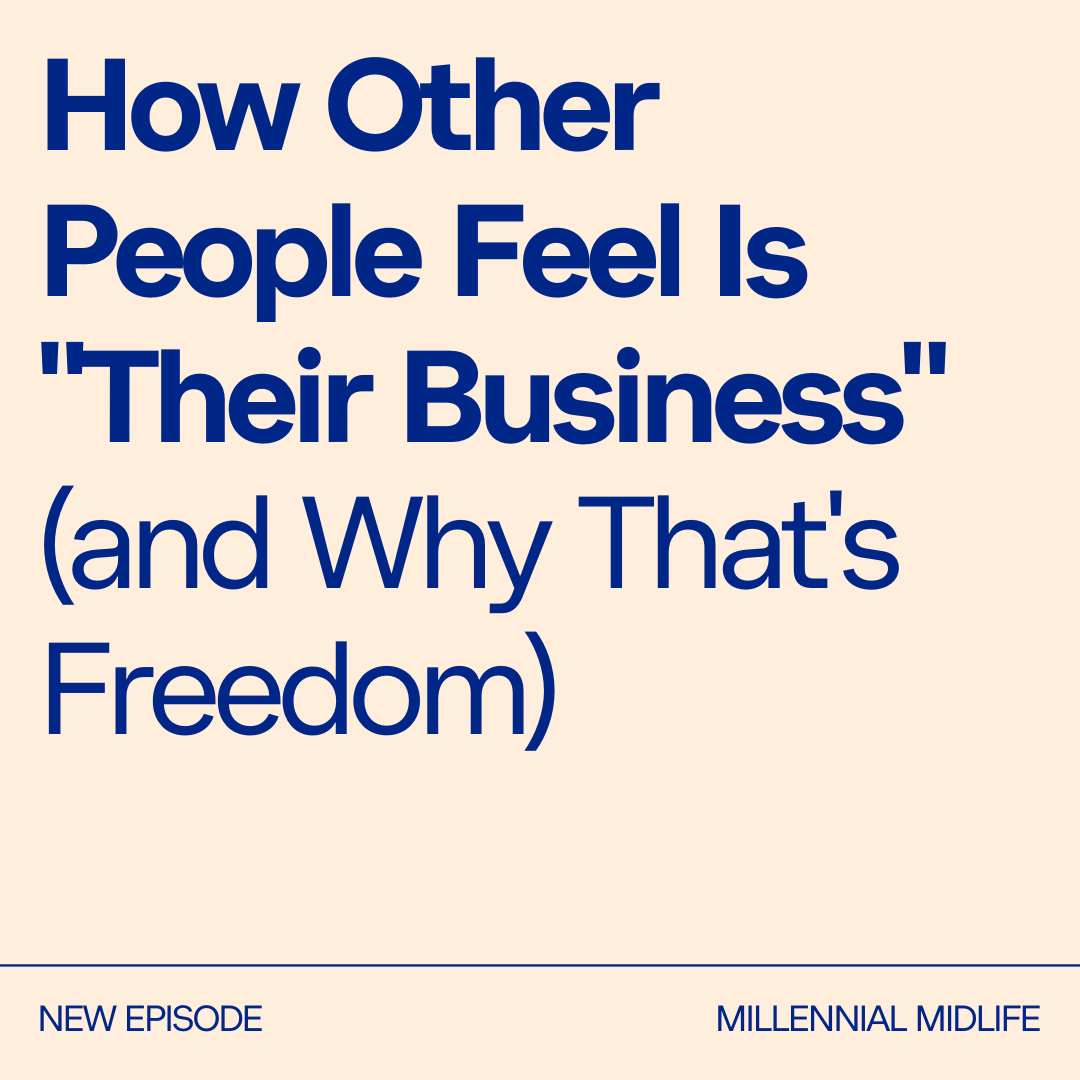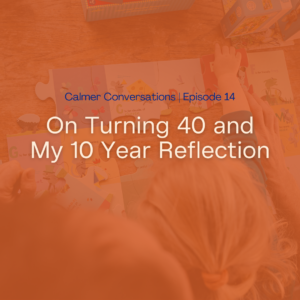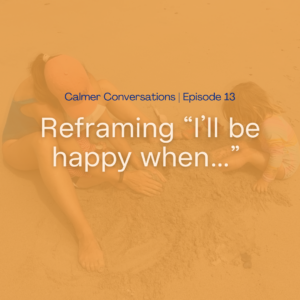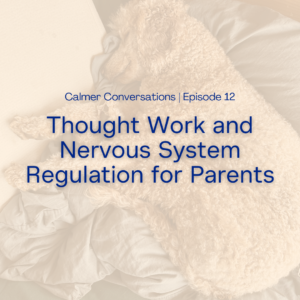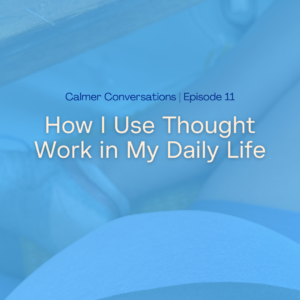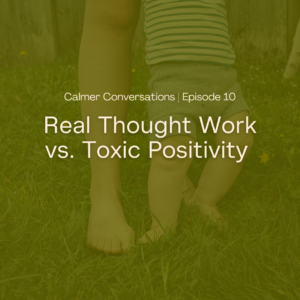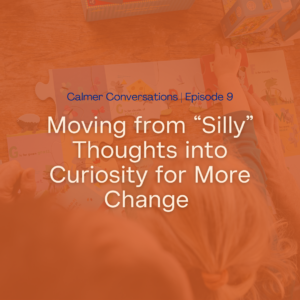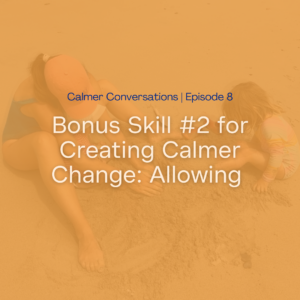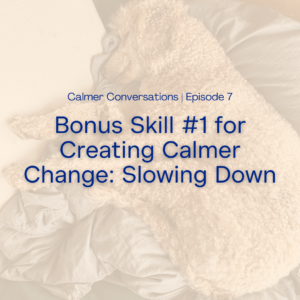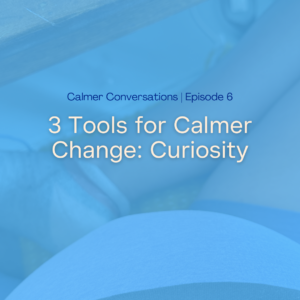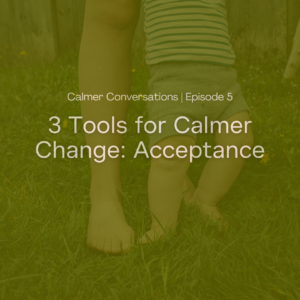Cecelia Baum Mandryk (00:01.614)
This time of year, people pleasing can skyrocket. And when I’m recording this, it’s the holidays, by the way. So we want everyone else to be happy. We want everyone else to have a magical time. We want people to think that we’re kind, we’re grateful, we’re generous, we have it together. We’re easy to be around. Maybe we’ve changed and evolved since they saw us last year, whenever the last time was that they saw us. But often in the middle of all this people pleasing and all this holiday stuff, right, we started talking about last week, we lose track of ourselves.
So we start managing everyone else’s emotions instead of our own. We start to think that we can manage other people’s emotions. So today I wanna talk about something that blew one of my clients minds last week. And honestly, it might blow your mind too. It’s this, we cannot create feelings in other people. We can’t make them feel a certain way. I wanna say that again, because it sounds so simple and it is simple, but it can be revolutionary, right?
You cannot create a feeling in another person. You cannot make them feel a certain way no matter what it is that you say or do. The flip side of this is just as powerful. You can intentionally create how you feel. You can work with your brain and with your nervous system to intentionally feel a certain way. Isn’t that wild?
And then also that no one else can create feelings within you. If you can’t create feelings in other people, then other people can’t create feelings in you. Which maybe triggers a little bit of like, but I want somebody else to be responsible kind of thing. But it should also empower you. Oh, I actually have a say in this. Okay, it might sound simple, but when you really understand it, it can be life changing, it can feel like freedom, relief, all those. can give you lots of time back, as my client said. I’ll make it into one.
Cecelia Baum Mandryk (02:19.694)
All right, so let me set the scene just for a little bit. So where this came from and why I wanted to talk about it today. Cause I really do think that it’s so powerful and it’s one of those things that it’s this truth that I kind of have in my life and operate by and it comes up in coaching. And I forget sometimes that other people don’t know these things, right? And that we all need to know that we all need to know that we all need this in our life. We all need to change. We all need to be empowered around this. Okay. So I was working with a one-on-one client. She’s just stepped into a new leadership role. And like most people,
who probably listen to this podcast are most humans that exist. She wants to form positive relationships with the people who work with her. She wants people to think she’s a good leader. She wants them to feel comfortable asking her questions. She wants them to feel valued, all those kinds of things. So we’re talking about, and one of the reasons why we’re working together is to kind of help this kind of thing. So she said to me, there’s this one person who is kind of in the role that she was hired for, you’re kind of the acting person in there.
And she really, she’s a little concerned about him, right? She wants him to feel valued. She doesn’t want him to resent her. She wants him to feel like he’s, like he has strengths and all those things, right? She wants him to feel good, essentially, right? That’s a very vague word, but she wants him to feel good. And I said, because I’m there as a coach, right? I mean, obviously I understand that. And if we’re just girlfriends talking, if you’re like, yeah, I get it. But because I’m a coach, I mentioned, you know, you might not actually be able to make him feel or not feel anything.
no matter what you say or do. And she, could see this kind of clicking in her head, right? She took a breath and said, I never thought about that. But if it is true, and this is kind of later in the conversation, I’m not, this is not an exact quote, right? If that is true, my life just got so much easier. I spent my life, decades, trying to control how others feel. Trying to like, it’s like an intricate chess game, right? Like, well, what do I say? And how do I show up so they can feel this certain way? And I need that person to feel this certain way.
And I thought exactly. And that’s where so many of us live, right? Thinking that we actually have responsibility for how everyone else feels around us and that everything we do needs to be calculated so that they can feel a certain way. Because that’s what we learned as kids. We made mom feel mad, bad when we didn’t like her dinner. I’m gonna get back to that. We made grandma feel sad when we told her that her sweater was scratchy. We made our friend feel mad when she got a better grade. I just realized I picked bad, mad, sad. anyway.
Cecelia Baum Mandryk (04:47.758)
It’s no wonder we grew up believing that we have the magical ability to control other people’s feelings, right? That’s what we’re told over and over again. We’re told this explicitly. Your behavior made me angry. You made me proud. You hurt my feelings, right? The vernacular, the way we express these things, particularly from adult to child, reinforces this. But even as we’re adults, and I remember just now, I remember being in this one, like,
It was a soft skills training when I was a geologist. And you we, you’re told to frame this when you did this, it made me feel this way. Right. We’re actually told that anyway, it’s baked right into our culture into our everyday language. And we absorbed it as the truth and the adults around us aren’t trying to mess us up. Right. And even like the stuff that you probably see on social media right now, it’s not trying to mess you up. They’re trying to help you be kind, feel like you can have boundaries, be aware of, be aware as a human, right. When you’re growing into being a kid, you’re trying to create nice
humans. But what we actually learn when you’re on the other side, I’m responsible for how other people feel. I’m responsible for how other people feel. I can control how Betty, my friend, feels. I control how grandma feels. I’m responsible for how other people feel. That’s a lot to take on as a kid, right? That’s a lot to have as a human. I’m responsible for how other people feel.
And so we grow up and we become adults trying to do just that. We spend so much effort trying to manage emotions, other people’s our own. Actually, a lot of times we put ours on other people. And it’s confusing when our efforts don’t always work, right? When you’re in the middle part of your life, it’s also likely that you’re managing up your parents, you might be managing down your kids.
You’re managing laterally peers, you’re managing maybe people that work for you or your own bosses or boards or whoever, whatever your structure is, you’re managing a lot of different people’s emotions in a lot of different directions. And I get it when my client’s like, my gosh, I’d have so much time left in my life. Like I’d have so much effort if I didn’t have to do this, that’s it. How we know this is kind of true is when you start to show up,
Cecelia Baum Mandryk (06:58.498)
you it’s confusing because this doesn’t always work when you try to manage emotions. you’re, if you’re somebody you tell Jane that she did a really good job, she blossomed, she feels proud of herself, you can see her. But you tell Jen the same thing, she did a great job and you can see her like shrink back and get smaller and maybe even kind of almost intentionally self-sabotage the next round. The same words were said, but you have two totally different reactions. It’s not about your words or even your intention there. It’s about how they’re received.
So we can be left thinking, did I do wrong when we’re in that situation? But it’s because it’s not you, right? It’s that everyone else’s feelings come from their own thoughts and their own nervous system state in the moment. We’ve just been operating on a false premise. We’ve been operating on this premise that we cause other people’s feelings and the truth is that they cause their feelings. And this isn’t to make you a jerk or to kind of, to kind of perpetuate the lie that like we’re not interconnected because we are, but you’re not responsible for how they feel.
Okay, so what does it actually mean that we can’t create feelings in other people? It means that what we say or what we do, what we say and we do, right? How we act in the world gets run through somebody else’s filters. They all have filters. Their beliefs about themselves and the world around them, their current nervous system state, their own history. And so what comes out, it’s like this very interesting game of telephone, right? Like you say something or you do something.
And we think it’s just gonna be passed along, but it never is, right? Because what I say and what you hear are very often two different things. What I intend and what you receive is not always the same. And that’s also interesting, because we try and use it against kids. Like when we say something and they receive it differently, we’re like, but I meant this. But you should receive it exactly how I meant. But how many of us do that with other people? We don’t, right?
We receive it how we receive it through our own filters, through our own histories, our emotional experiences, all these different layers that we have that often are changing too as we exist, right? So here’s an example that I’ve loved. You make someone their favorite meal, and I’ve always used mac and cheese because I’m from the US and that feels like a very standard favorite meal, right? Mac and cheese. One person, you they’ll come over and one person might
Cecelia Baum Mandryk (09:21.016)
come in and smell the mac and cheese in the oven and think, she loves me. They feel so loved. They feel so warm. They feel so comforted. They feel so excited for the meal. They start salivating, right? Like they can taste it. They’re thrilled. They they’ve even had this mac and cheese that I’ve made before and they are just, but then someone else might think, right? Somebody else or the same person at a different time might come in and have like smell the smell and feel this immediate like, like slum.
a disconnection, maybe even a sadness, then they might think they don’t even know me anymore. Because this person is running it through the filter of I’m dairy free and gluten free now. And if they’re making mac and cheese, they didn’t even listen to me. They don’t know me. Same mac and cheese, totally different thoughts, totally different feelings. Right? Same mac and cheese, same intention from the person behind it. I’m making this because this was their favorite meal.
because you actually can’t know someone else’s filters. You can’t know all of their history. You can’t know all of their associations. You can’t actually know all of the different parts that your words are gonna go through the like little, do you remember the prices, right? Was it like Planko or Planko or something where the like the little ball goes on these different routes. If you’re watching me on YouTube, you can like see my hand go back and forth. You can’t understand which route the chip is gonna make on a certain day. You just don’t.
No, because you’re not them, right? So you can influence someone’s experience perhaps, but you can’t create it for them. And there’s a difference there. So for instance, my client could actually have a conversation with her colleague or with her, with her subordinate, right? She can say, I really do value your work and I want to make sure that you feel appreciated. How can we help to make that happen? Right? So then you’re co-creating an experience, not trying to control it for them.
and not assuming that what I do and say will create a specific feeling within them or a specific reaction and I’d be shocked when it doesn’t or it does sometimes and doesn’t other times. So when you start to step into this and I hope you’re starting to feel it or it’s starting to filter through your brain in a way where it does feel a little bit like freedom or relief because you can actually stop working so hard to manage the impossible, right? To control this thing that you can’t actually control. All right.
Cecelia Baum Mandryk (11:40.962)
So why do we try so hard to manage other people’s emotions anyway? Why are we here? Usually because we’re afraid of if somebody’s unhappy, that we’re unlovable, if somebody’s disappointed, well, we failed, if someone’s upset, we’re a bad person, because we make it mean, right? you made me upset. That means you are an upsetting person, right? Because our childhood brain took a lot of these things and it made imperfect connections that are still the logic our brain is running on.
then we kind of make people’s reactions mean something about us. They make us feel a certain way and we don’t like that. We believe, and this is very often subconscious or unconscious as we go through our day, if someone feels better, we will feel better, right? If they’re happy, I can be happy. I cannot be happy unless they are happy. And so I need them to be happy so that I can feel happy. If this guy likes me as a boss, I can feel good about myself. If my mom’s happy with me, I can relax. If my partner praises me, I can feel confident about my body.
Right? And it gets all so tangled up so quickly. So we start acting not from authenticity, but from emotional control. We try and control everybody and everything around us, right? And that takes so much energy and it rarely works. We start downing ourselves, abandoning ourselves, trying to be whoever we think other people want us to be. Again, so that we can feel a certain way. So they feel a certain way so that we can feel a certain way. It starts to get like, can’t even, like the words even get convoluted in my brain.
So how do you know that you’re in this emotional management mode? A lot of times we feel tight, we feel controlling, we feel insecure. We feel like we’re playing that chess, this like mental chess about like how we are and how other people need to be and what we need to do to make things feel good. I’m using air quotes here. So you can ask yourself, am I trying to create a feeling for them? What will I make their feelings mean about me? Honestly, this part is just like there’s so much slowing down, people pleasing.
can be so intertwined with perfectionism and so intertwined with who we are and how we are as a person, like how we see ourselves, that just slowing these things down and becoming aware, like my client, I want this person to feel X. I want them to feel valued. And so I’m gonna try and manipulate them so they can feel valued.
Cecelia Baum Mandryk (13:56.994)
that’s it, right? Because that’s often what’s in there. If this person feels valued, I’m a good leader. If he feels resentful and bad at my job, so then we get self-worth all mixed up into it too. So when you notice that you’re doing this, I want somebody to feel a certain way, or I think I need to help them feel a certain way, or I feel uncomfortable if they’re uncomfortable. This is whole different episode, so we’re gonna go into that too. Allowing other people to feel certain emotions and allowing yourself to feel certain emotions. But when you notice this,
propensity come up, this desire to get someone to feel a certain way, take a breath. Because pausing, bringing it to your awareness, that’s the way out, right? That’s where the relief starts. That’s where you get to start to work with our brain. That’s where you start to get to notice the habit your brain is in. Here’s the really freeing part. If you can’t make someone else feel something, they can’t make you feel something either. And again, this is probably should be an entire episode, but like you, they can’t make you feel something. How you feel.
comes from what you think and what you believe, all of your filters. So let’s take an example, right, from me, my partner, or, you know, whatever. This has come up for me, but for other people. So your partner buys you flowers, but not the kind you like. Your brain can jump to, they don’t even know me, I’m in love.
Or, and, what you can do is you can notice that first thought and choose another. They bought me flowers because they love me. I can choose to feel love right now. I can tell the story, they don’t know me and feel unloved. Or I can notice they bought me flowers, likely because they love me, right? Or at least they thought I might like flowers. Your kid, my kid, says something like, everything you make tastes like dog vomit. How do you even know what dog vomit tastes like, child?
Your brain says, oh, I’m a terrible mom, right? And I’m like kind of laughing because this is me, right? This is, I’m high, I’m the person. In that moment, I can tell myself I’m awful and I should like know what my kid likes or I can put it back on them. You make me feel bad because you’re telling me you don’t like my food or you said you liked this yesterday. How dare you not like it today? In the moment, I can say my child is allowed to dislike dinner to myself and it doesn’t mean anything about me.
Cecelia Baum Mandryk (16:10.606)
They’re allowed to have changing food preferences. It’s no big deal, right? It’s not a big deal unless I make it a big deal about my own brain. When you slow down and watch your own brain and watch the stories it tells you, these kind of like snap, like the quick story that comes out, you usually don’t even, it’s not like a conscious choice, right? But it just comes. Then you get the space between what happens outside of you and how you feel inside. You start to create the space there so that you get to intentionally
choose how you want to feel. That space right there, this is like the pause that they talk about in mindfulness. That’s all of our power is there. And honestly, the relief and this has come up a few times in coaching both one on one and in group recently is that the relief feeling better starts that moment that you slow things down and notice the story and notice that it’s just a story. It’s not a truth about me. It’s just a thing I’m telling myself. That’s when we can like, can get a breath, right?
And then we can actually maybe do some tapping. We can do some movement, somatic release. I do like a shaking thing sometimes. You can just take a few breaths. You can do a little like wiggle shake thing, which is kind of fun. This is where nervous system regulation comes in, right? Reminding yourself, I’m safe right now. I get to choose the story that I perpetuate. Whatever story has been going on, no big deal. I can recognize it. I can feel those feelings. And now I get to change it. I get to do something different.
From that place you get to decide, how do I want to feel right now? Calm, loved, neutral, grateful. Neutral is an amazing one, by the way. It doesn’t need to be something positive. Like, I don’t need to feel great when my kid tells me that my food tastes like dog vomit. I can also just not feel bad. I can just be there and be like, you’re unhappy with how dinner is tonight, right? This isn’t something you like. You wish that I made something else, really, is what she’s saying. You can create that intentionally.
Okay, so this is so relevant right now because I mean, it’s relevant all the time because we’re all always doing this. But right now the holiday season, again, it becomes like this pressure cooker where things we’re already doing in life kind of get amped up. It’s prime people pleasing territory. We want everything to feel magical. Kids, parents, friends feel happy, loved, we’re generous, kind. They want them to think good things about us. So it gets super tangled up in this time of the year. You’re not wrong for wanting your loved ones to have a good time. You’re also you’re human, right? Like you just have a human brain.
Cecelia Baum Mandryk (18:33.826)
But you can also just choose to watch your brain this year. Watch when you’re taking responsibility for other people’s emotions. And even you can have this kind of, this, you can make a decision right now, and I hadn’t thought about this when I was making notes, but you can make a decision right now to say, am not, I’m going to release myself from responsibility for how other people feel. I released myself. had a time. I just decide I’m releasing myself and I’m gonna notice every time I start to step back into that and I’m gonna release myself again.
So you can create a different emotional experience this holiday season. Even if the people around you are stressed, disappointed, chaotic, right? That’s what emotional freedom really is, freedom in general as a person. This is where calmness and peace also comes from, right? Because you’re suddenly working with yourself differently. You can let other people have their emotions. And this is where I said we’re probably gonna do a part two that, and maybe it’ll be like just a little short, bonus-y type episode of.
the capacity to let other people feel emotions. The capacity to sit and let someone have a feeling and not make it mean anything about you. Right? But you can kind of consider what that might mean for you. It’s such a big piece of this. Okay, so the takeaway, maybe even a little experiment. If you want to take away one truth from this episode, let it be I’m only responsible for how I feel. It doesn’t make you cold or detached. It doesn’t make you a jerk.
It makes you free. actually allows other people to have their emotional experience. It actually is like, it’s a loosening. It’s like an opening. It’s like a breath for everybody. So here’s something that you can start to do in your week. And if you start practicing it now, you’ll get more practice before the holidays ramp up even more. And so when things, when you’re like visiting family or something, you’ll have more. Oftentimes it just becomes bigger. Or maybe I’m just speaking for myself when I’m around family. Okay.
Notice the moment we’re trying to make someone feel a certain way or when you’re making someone responsible for your own feelings and in that moment see if you can pause and remind yourself. I can’t make them feel anything. They cannot make me feel anything without my permission or agreement and see if something can shift. See if you can do one of those somatic releases or tapping or breathing, you know, do a little wiggle, shake a dance. You know that song Dancing in the Moonlight? My youngest child is
Cecelia Baum Mandryk (20:53.698)
really likes that song right now and there’s this line in it that I’d never heard before but it says you can’t dance and stay uptight and I just think that’s so brilliant and so if you just want to do a quick minute dance party for yourself it is very hard to dance and stay uptight. I can’t remember the name of the band but the dancing of the moonlight song right? Okay I can’t make them feel anything they can’t make me feel anything see what shifts there. Life can feel so much lighter when you stop trying to manage everyone else’s emotional weather what’s happening within them because again you can’t do it.
You can show up as yourself, grounded, calm, kind, even stressed version of you that’s less entangled and that everyone else have their own thing, right? Let them have their emotional weather, you have yours. That’s where peace is, that’s where power lies. All right, thank you so much for being here with me today. I hope this resonated. I hope this gave you maybe hope of a different way of existing or other human beings possibility, right? Remember that this is, you can take so much away from these episodes and do so much work, but if you wanna dive in deeper,
Come coach with me, right? Come into the Life Lab or get in touch about one-to-one coaching and see if we’re a fit because changing this is such a game changer in your life. And know that there’s gonna be a part two where we talk about what it looks like to actually let people have emotions, let ourselves have emotions without trying to fix them immediately. So see if you can notice when you’re doing it. Remember you’re human, so if you’re in this habit, it’s no big deal. You’re just in a habit. We can shift it. You can bring awareness to it. You can love yourself through it, in fact.
You can’t make anyone feel anything. If this did resonate and you feel called to share it with somebody, please share it. If you feel called to write a review, that’d be so helpful. It’s super helpful to have reviews if this has been powerful for you. Otherwise, come say hi on social media or send me an email and I will see you the next time I see you. All right, bye.

